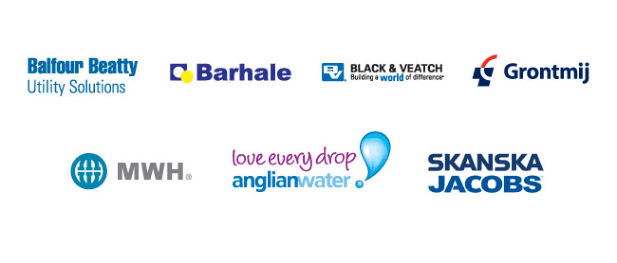We recently attended an evening event at the Cambridge Judge Business School where different organisations were asked to speak to the MBA students about “effective integration”.
Amongst the talks was a really fascinating presentation by Dale Evans, who is in charge of the Anglian Water’s @one Alliance. Dale and his team had studied how and why they won projects that they tendered for. The projects they tender for are often huge engineering infrastructure projects, like building dams, or “re-plumbing” a city. They tend to “pitch” as a consortium, joining forces with other project management companies and contractors. More interestingly they also studied what happened once they had won a tender, and whether the project was a success; meeting both government client and commercial objectives.
Anglian Water found that they put 80% of their effort into assembling a team and pricing to win the tender and just 20% of their effort into thinking what they would do if they won the tender. Conversely, of the projects that “failed” only 20% were because of a failure in the tender document and agreement. Rather, 80% of the failures were because, after the tender had been won, consortia members were poorly integrated and coordinated, often falling out and even suing each other.
The incredibly enlightened team at Anglian, radically broke with the conventions of their sector. They formed a new company, made up of a selected set of partner companies from consulting, contracting and engineering; the whole ecosystem. This team “Anglian @one Alliance” was to be both responsible for pitching and delivering the projects they won. They all had “skin” in the game as they owned their own share of the new Anglian Alliance team. The organisational set-up meant they spent far less time setting up consortia, wrangling over fees, and tendering, which allowed them to reverse their previous thinking and put 80% of their efforts on thinking about how they would actually build the projects they were pitching for.
The improvement in tendering and the satisfactory delivery of projects both dramatically improved. The integrated Anglian Alliance offering worked far better than the consortia led model.
So, what learning could agencies, marketers and marketing procurement professionals take from Anglian Water’s @0ne Alliance?
1. Follow Anglian Water’s “reverse Pareto”. Put 80% of effort/importance on how agency and client will work together, and how the integrated agency ecosystem will work brilliantly to build amazing campaigns. Put only 20% of effort/importance on the pitch itself/pricing. If you are on the client side you may consider getting your potential agencies to focus on specifying exactly how they will work, and exactly how they will deliver ideas. We are working on an agency pitch at the moment where all the agencies participating in the pitch can deliver a great idea, but success will be defined by how well they understand the client’s culture, how well they can pick up the processes, and how well they can integrate their systems with other agencies. The pitch scorecard reflects this.
2. Think Ecosystem. Anglian Water were incredibly enlightened to purpose build their own long-term ecosystem of resources, and to link their fortunes together. ALL successful teams have a shared accountability for success and failure and yet in our experience very few clients make each agency accountable for each other’s actions. Please note the lazy way to do this is to appoint a holding company, and hope that they can build an effective “internal” ecosystem from the sum of their parts. There are some cases where this has worked however; there are also a lot of failures including, at last count, five lawsuits for failed contractual commitments. We are working with a great client at the moment who is using 360 degree appraisals, and shared team goals to drive rewards across a mixed ecosystem of independent agencies and agencies that belong to holding companies. This client is ensuring all agencies work together to present a single point of view, and is linking them via shared technology, and processes. We will share details as a case study shortly and as confidentiality permits.
3. Skin in the game. Do not be greedy. Give the agencies the potential for upside, as well as the opportunity to feel your pain if things do not go according to plan. Ensure that shared objectives are set that the team that can deliver. Naturally, they will be SMART, and will complement individual agency specific goals.
4. Full ecosystem pitch. The COI (Central Office of Information) used to be the UK governments communication agency. It led government campaigns. When it needed agencies for a project it would specify different agencies and ask them to pitch together, as a team. The COI client would tell creative, media planning, PR and digital agencies to work together, and largely they did. In the USA several large clients have also picked agencies to work together, to deliver a pitch, and awarded the business on the basis of their integrated efforts. Whilst this style of pitch is better used for projects, new products, or start-ups, the principals behind it are sound; have agencies integrate, and make them accountable as an ecosystem.
5. Specialist project management. A key part of the Alliance approach was to have a dedicated specialist project management company at the heart of their ecosystem. Many other categories, other than engineering and construction, also employ specialist project managers. It is a mystery as to why advanced and complex advertisers would not also specify a specialist integrated project manager to help deliver their campaigns. Perhaps, it is just an appendix of the day when clients just had one agency, but when they now, on average, have seven and ten percent have twelve or more, it’s surely time for a change.
So, if you would like to take an 80:20 pitch and turn it into a 20:80, with better overall results, give us a call and we will show you our Pareto pitch! Contact us here.
Comment Policy
Thanks for visiting the our Flock Blogging page, where we welcome your comments. Since this is a moderated blog, all comments will be reviewed prior to posting. As a result, there will be a delay in the posting of comments and not all comments will be posted. Comments may also be removed after they are posted. Thank you for your understanding.





